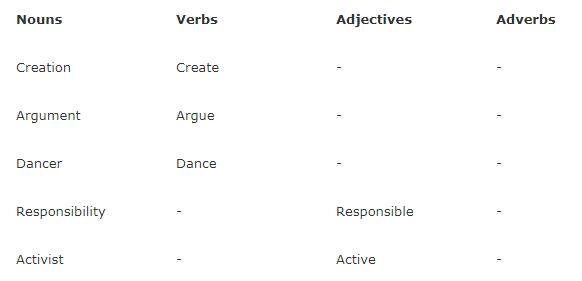VOA名师答疑2022--Learning New Words: Parts of Speech, Suffixes
搜索关注在线英语听力室公众号:tingroom,领取免费英语资料大礼包。
(单词翻译)
Learning New Words: Parts of Speech, Suffixes2
playstop
mutemax volume
00:00-05:57
repeat
By Faith Pirlo
29 April 2022
Hello! This week on Ask a Teacher, we will answer a question from Erol from Turkey.
Question:
Hello,
My name is Erol. What is the best way of learning words? I am very confused about this subject. Can you give me some advice about learning words, please?
Answer:
Thank you for emailing us this very important question, Erol!
There are many ways to learn words in English. Over the next two weeks, we will talk about learning different parts of speech, or word families, and using suffixes.
What are parts of speech or word families?
Many language teachers say there are eight different parts of speech in English. We will look at the four major parts of speech that include most content words: nouns, adjectives, verbs and adverbs.
Nouns are people, places, things, or ideas. Adjectives are words that describe nouns. Verbs describe actions or states of being. And adverbs describe adjectives, verbs or even other adverbs.
In this simple sentence we can see all four major parts of speech.
Warm days have quickly come.
"Warm" is the adjective that describes the noun, "days." "Quickly" is the adverb that describes "have come," the verb in the sentence.
Suffixes
We use suffixes after the base form or root of a word. The root is the simplest form of the word. We can use suffixes to change the meaning of words by adding them to the base form.
So, if we know one word, like a verb, we could use a suffix1 to change that part of speech to another part of speech. This idea is very helpful for learning new words. We can create several new words from a base form when we add suffixes.
For example, if we have the verb "to argue," we can add the suffix -ment to make the noun "argument."
Or if we have a verb like "create," we can add -ive to the end to make the adjective "creative."
In this case, we drop the final e at the end of the verb and add the suffix.
Making verbs
To turn some nouns and adjectives into verbs, we can use the suffixes -ize or -ify.
For example:
"Beauty" (noun) + suffix -ify = "beautify"
Remove the -y and add the suffix.
"Organization" (noun) + suffix -ize = "organize"
We can drop the ending -ation, a noun suffix, to get the base form. Then add –ize, the verbal ending.
Making nouns
To turn some verbs into nouns, we can use the suffix -er, -ment or -ation.
For example:
"Argue" (verb) + suffix -ment = "argument"
Drop the -e and add the suffix.
"Dance" (verb) + suffix -er = "dancer"
"Create" (verb) + suffix -ation = "creation"
Drop the -e and add the suffix
Some adjectives can also become nouns with suffixes -ity or -ty.
For example:
"Responsible" (adjective) + suffix -ity = "responsibility"
Drop the -e and add the suffix
We can also use the suffixes -ist or -ism to make other nouns.
For example:
"Active" (adjective) + suffix -ist = "activist3"
Drop the -e and add the suffix
"Magnet" (noun) + -ism = "magnetism4."
Some English teachers use a chart to show the possible words you can make using suffixes.

图片1
Next week on Ask a Teacher, we will continue learning how to make new words by adding suffixes. And we will fill in the chart of words we have been talking about by making adjectives and adverbs with suffixes.
Words in This Story
suffix –n. a letter or group of letters added to the end of a word to change its meaning
confused – adj. to be uncertain or unable to understand something
content words – n. words that add meaning to a sentence
chart –n. a form of presenting information using a table or columns to group things
 收听单词发音
收听单词发音 




